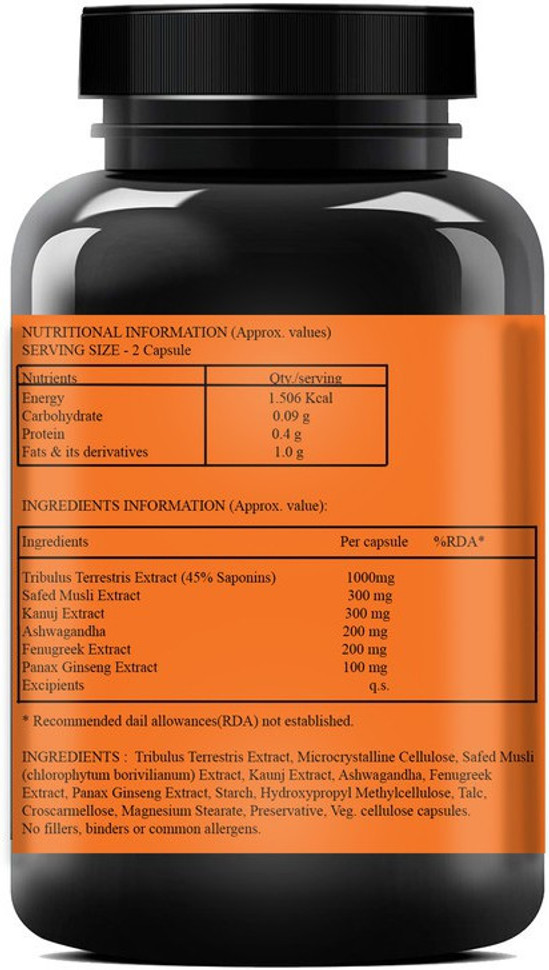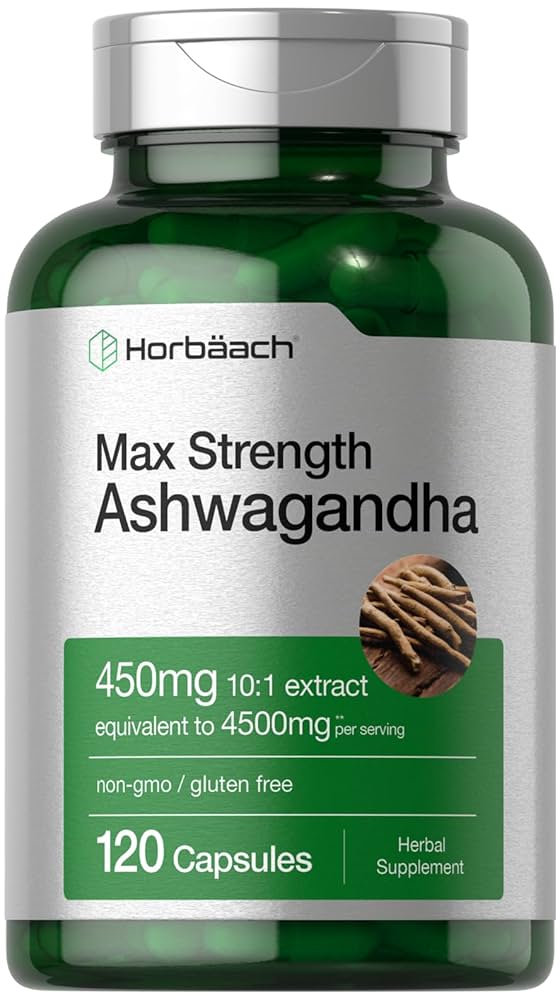
Ashwagandha Xtract 600
by Nature's Promise
Key Benefits
- Helps reduce stress and anxiety
- Supports healthy sleep patterns
- Promotes cognitive function
- Boosts energy levels
Product Overview
Ashwagandha: A Comprehensive Overview
Ashwagandha (Withania somnifera) is an ancient medicinal herb used in Ayurvedic medicine for thousands of years. It's classified as an adaptogen, meaning it can help your body manage stress. But what exactly makes ashwagandha so special? What are the benefits, and are there any risks to be aware of?
This overview will delve into the science behind ashwagandha, exploring its potential benefits, side effects, dosage, and how it compares to other stress-reducing supplements. We'll answer common questions like:
- What is ashwagandha, and where does it come from?
- What are the active compounds in ashwagandha, and how do they work?
- What are the clinically proven benefits of taking ashwagandha?
- Are there any potential side effects or interactions with medications?
- How does ashwagandha compare to other adaptogens like Rhodiola or Ginseng?
- What is the optimal dosage for different needs?
Whether you're looking to reduce stress, improve sleep, or enhance cognitive function, ashwagandha may be a helpful supplement. Let's explore the details.

How It Works
How Ashwagandha Works
Ashwagandha's adaptogenic properties stem from its complex blend of active compounds, particularly withanolides. These compounds interact with several key systems in the body:
- HPA Axis Modulation: Ashwagandha helps regulate the hypothalamic-pituitary-adrenal (HPA) axis, the body's central stress response system. By modulating cortisol levels, it helps the body adapt to stress more effectively.
- Neurotransmitter Regulation: It may influence neurotransmitter levels, such as GABA, which promotes relaxation and reduces anxiety.
- Antioxidant Activity: Ashwagandha's antioxidant properties help protect cells from damage caused by free radicals, which are implicated in aging and various diseases.
- Anti-inflammatory Effects: It exhibits anti-inflammatory properties, which can contribute to overall health and well-being.
- Immune System Support: Some research suggests that ashwagandha may enhance immune cell function and response.
By targeting these pathways, ashwagandha helps the body maintain homeostasis and better cope with various stressors.

Benefits & Research
Benefits of Ashwagandha
- Stress Reduction: Ashwagandha has been shown to lower cortisol levels, a hormone produced in response to stress.
- Improved Sleep Quality: It can promote relaxation and reduce anxiety, leading to better sleep.
- Enhanced Cognitive Function: Some studies suggest it may improve memory and focus.
- Reduced Anxiety: Ashwagandha has demonstrated anti-anxiety effects in clinical trials.
- Increased Muscle Strength: It may help increase muscle mass and strength, particularly when combined with resistance training.
- Improved Stamina: Ashwagandha can enhance physical performance and reduce fatigue.
- Supports Thyroid Function: Some research indicates that it can help improve thyroid hormone levels.
- Supports Immune Function: Ashwagandha has antioxidant and anti-inflammatory properties that may support immune health.

Potential Side Effects
Potential Side Effects
Ashwagandha is generally considered safe for most people when taken in recommended doses. However, some individuals may experience mild side effects, including:
- Drowsiness: Due to its relaxing effects, ashwagandha can cause drowsiness.
- Upset Stomach: Some people may experience mild digestive discomfort, such as nausea or diarrhea.
- Headache: In rare cases, ashwagandha may cause headaches.
- Allergic Reactions: Allergic reactions are possible but uncommon.
Important Note:
- Pregnant or breastfeeding women should avoid using ashwagandha.
- Individuals with autoimmune diseases should consult their doctor before taking ashwagandha, as it may stimulate the immune system.
- Ashwagandha may interact with certain medications, such as sedatives, immunosuppressants, and thyroid medications. Consult your doctor before use if you are taking any medications.

Frequently Asked Questions
What is the best time of day to take ashwagandha?
The best time to take ashwagandha depends on your goals. For stress reduction, taking it in the morning or throughout the day with meals can be effective. If you're using it for sleep, taking it 1-2 hours before bed is recommended. Experiment to see what works best for you.
How long does it take for ashwagandha to start working?
The effects of ashwagandha are typically gradual. While some people may notice improvements within a week or two, it generally takes 4-8 weeks of consistent use to experience the full benefits.
Can I take ashwagandha with other supplements?
Ashwagandha is generally safe to take with other supplements. However, it's always a good idea to consult with your doctor or a qualified healthcare professional before combining supplements, especially if you're taking medications.
Is ashwagandha safe for long-term use?
Ashwagandha is generally considered safe for long-term use when taken in recommended doses. However, it's always best to cycle off supplements periodically to prevent tolerance and ensure continued effectiveness. Consider taking a break of 1-2 weeks every few months.
Can ashwagandha cause weight gain?
There is limited evidence to suggest that ashwagandha directly causes weight gain. However, it may indirectly influence weight by improving stress management and reducing cortisol levels, which can contribute to healthier eating habits and metabolism. In some cases, increased muscle mass due to ashwagandha's potential anabolic effects might lead to a slight increase in weight.
Are there different types of ashwagandha extracts?
Yes, there are different types of ashwagandha extracts, with varying concentrations of withanolides, the active compounds. KSM-66 is a popular and well-researched extract known for its high potency and bioavailability. Always check the label for the specific extract and standardization to ensure you're getting a high-quality product.
Can ashwagandha help with hair loss?
Some anecdotal evidence suggests that ashwagandha may help with hair loss, potentially due to its stress-reducing and anti-inflammatory properties. Stress can contribute to hair loss, so by managing stress levels, ashwagandha might indirectly support hair health. However, more research is needed to confirm these effects.
Detailed Scores & Effectiveness
Product Scores
Effectiveness by Goal
Customer Reviews (6)
Great for Stress Relief!
I've been taking this for a month and have noticed a significant reduction in my stress levels. I feel much calmer and more focused throughout the day.
Helps with Sleep
I've been having trouble sleeping for years. This has helped me fall asleep faster and stay asleep longer.
Excellent Product
High quality ashwagandha. I can feel the difference in my energy levels and overall mood.
Good Value
Effective and affordable. I will definitely be repurchasing.
Noticeable difference
I can see a difference in my anxiety when taking this supplement. However, it is nothing too major.
Amazing Quality
Great quality ashwagandha. I feel much better, much calmer.
Product Specs
Key Ingredients
Ashwagandha Root Extract
Grade ABlack Pepper Extract (Piper nigrum)
Grade CCertifications
Important Warnings
- • Consult your physician before use if you are pregnant, nursing, taking medication, or have a medical condition.
- • Keep out of reach of children.
- • Do not exceed the recommended dosage.
- • May cause drowsiness. Avoid operating heavy machinery while using this product.
- • Not intended for individuals under 18 years of age.